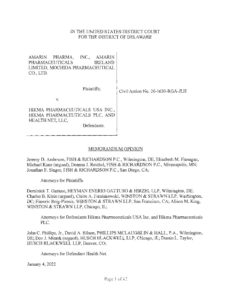by Wallace Feng
Induced Infringement of Method Patents
On January 4, 2022, the District Court of Delaware dismissed allegations of induced infringement that were based on a generic drug label and related advertisements Amarin Pharma, Inc. et al. v. Hikma Pharms. USA Inc. et al., No. 20-1630-RGA-JLH, D.I. 97 (D. Del. Jan. 4, 2022).
Here, Amarin Pharma, Inc., Amarin Pharmaceuticals Ireland Limited, and Mochida Pharmaceutical Co., Ltd., (collectively, “plaintiffs”) had asserted three patents against Hikma Pharmaceuticals USA Inc. and Hikma Pharmaceuticals PLC (collectively, “Hikma defendants”). (Id. at 2.) The patents relate to methods of using icosapent ethyl for the reduction of cardiovascular risk. (Id. at 2, 4.) The Amarin plaintiffs sold icoaspent ethyl under the brand name VASCEPA® for not only cardiovascular risk reduction, but also the treatment of severe hypertriglyceridemia, which is not patented. (Id. at 2, 4; D.I. 17 ¶¶ 27–28.) The Hikma defendants obtained FDA approval to sell a generic version of VASCEPA® for the non-patented indication. (D.I. 97 at 4.) Nonetheless, the plaintiffs alleged that the Hikma defendants induced infringement of their patents because of the generic label and various public statements made by the Hikma defendants. (Id.)
The court disagreed with the plaintiffs. First, the court found that the label for the generic product did not teach an infringing use and that the Hikma defendants were not required to expressly disavow the use of their product for cardiovascular risk reduction. (Id. at 6–7.) Second, the court observed that certain advertisements relating to the generic drug were insufficient to show inducement. (Id. at 7–9.) Specifically, the characterization of the drug “as the generic equivalent to VASCEPA d[id] not expose Hikma to liability.” (Id. at 8.) Nor did the marketing of the drug as “AB rated” in the therapeutic category of “hypertriglyceridemia” demonstrate inducement even though this rating might indicate that the generic drug could be used in an infringing manner. (Id. at 5, 7–9.)
In doing so, the court distinguished the present case from a recent appellate decision in GlaxoSmithKline LLC v. Teva Pharmaceuticals USA, Inc., 7 F.4th 1320 (Fed. Cir. 2021). There, the Federal Circuit affirmed a jury finding of inducement based on various public statements despite an attempt by a generic drug company to carve-out a patented indication. (Id. at 4–5.) The court explained that unlike the infringer in GlaxoSmithKline, “Hikma has not pointed to Vascepa's patented uses in describing itself as Vascepa's generic equivalent.” (Id. at 9.) As a result, the court concluded that the Hikma defendants did not specifically encourage infringement of the plaintiffs’ patents. (Id.)


